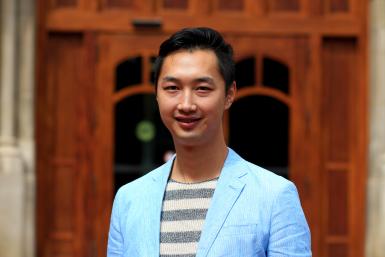Yan publishes “Black Lives Matter” discourse research
Public attention to problems of racial inequality did not decline after a summer of protests following the murder of George, according to graduate student Harry Yaojun Yan.
The Media School doctoral candidate documented how Black Lives Matter protests are influencing public attitudes in a research article published in Proceedings of the National Academy of Sciences.

“People’s attention didn’t go back to the previous level. It stayed at a higher level than before which shows that the attention is sustained,” Yan said.
In the article “Black Lives Matter protests shift public discourse,” Yan and his co-authors Zackary Dunivin, Jelani Ince and Fabio Rojas, inspected how discourse about the movement’s agenda was captured by social media and news reports and found that Black Lives Matter protests occur simultaneously with increases in public attention to the elements of the social and political movement’s agendas.
The authors started research on the discourse of Black Lives Matter after the George Floyd protests of 2020, but examined evidence as far back as the 2013 acquittal of George Zimmerman in the shooting death of Trayvon Martin. For the study, Yan said he collected data from Twitter, MediaCloud, Google Trend and Wikipedia and developed statistical models to test the research hypothesis and visualized the results for the audience.
“People search words they’ve never paid close attention to before like ‘prison abolishment’ and ‘systemic racism,'” Yan said.
He said the Black Lives Matter movement should be considered a successful movement that not only changes people’s attention, but also targets “a broadened anti-racism discourse and not just police brutality.”
This is the second project of racially focused research for Yan in the last year. In 2021, he co-authored “Camera Point-of-View Exacerbates Racial Bias in Viewers of Police Use of Force Videos” for the Journal of Communication.
In Yan’s research on social inequalities, the “Black Lives Matter protests shift public discourse” article shows that an already present cultural discourse can be examined using public data that tracks media and internet usage behaviors.
“We hope to facilitate any policy change if we can; but even if the movement does not lead to any direct policy changes, we think the cultural shift itself is just as important if not more so because policy only regulates behaviors but cultural norms change minds and our daily interactions with social minorities,” Yan said. “As we demonstrated the changing cultural norm in this research, that is also my own research goal and philosophy.”
Yan is pursuing dual degrees in Media Arts and Sciences at The Media School and Complex Networks and Systems at the Luddy School of Informatics, Computing and Engineering. While working with The Media School’s James Shanahan and Luddy’s Fil Menczer, Yan is also one of the Knight Foundation research fellows at Observatory on Social Media.

